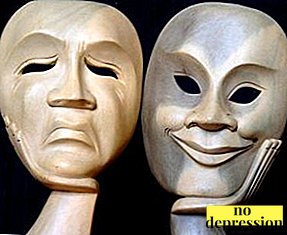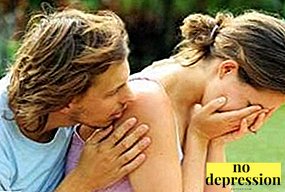Our emotions accompany us throughout our lives.
We do not even think about how many feelings we experience daily and how it affects us and our environment.
In fact, this very important and necessary aspect our life.
Without feelings and sensations it is difficult to imagine a full and happy life. Emotions help us feel empathize and just live.
What it is: the definition of

Emotions - from the Latin “emoveo” means “to excite”, “to worry” - this is an expression of how a person relates to a certain current situation, and how he manifests himself at the moment of experiencing some kind of life event.
Emotions come in two forms - objective - a person has certain feelings, his mental and physical condition changes (his pulse may increase, his breathing and facial expressions change) and subjective - directly personal inner feelings about the situation (feelings, thoughts, experiences).
The value of emotion in psychology
What is emotional? Emotionality is human traitcharacterizing the quality, process and content of those feelings that he experiences.
Emotionality is one of the main components of such a thing as temperament.
For emotional people, such signs are characteristic.: excessive impressionability, excessive impulsiveness, sensitivity, they all take to heart and are not shy about expressing and expressing their feelings.
Using emotion man vividly expresses what he feelsmanifests itself. Our feelings and experiences are an inexhaustible source of inspiration for all who seek it. Emotionality usually reflects the inner world of a person, shows his wealth.

Be emotional means to live a more diverse, vibrant and rich life, have unlimited opportunities for creativity, feel the thrill of sensations, live an interesting life, have a huge source of inspiration, all the time looking for and finding ways to release your emotions and creativity.
Emotionality is manifested differently in each type of temperament. Temperaments are divided into 4 types: choleric, melancholic, sanguine, phlegmatic.
What is related to emotions?
Emotions are positive and negative. Most professionals highlight The four most basic human feelings: anger, joy, sadness and fear. But it should be understood that they are much more.
These include: emotional reactions, that is, the experience of a particular emotion, affects - this is the most powerful and dangerous type of emotional reaction, mood, emotional excitement, emotional flow.
The most common is considered to be: interest, sadness, joy, surprise, fear, anger, shame, disgust, guilt.
What are they needed for?

Emotions - these are our feelingsWith their help we can experience everything that happens to us.
They define us as people.
Through them, you can see our attitude to life situations, they show it not only to us, but to everyone around you, therefore so important to be able to control them.
There is a huge amount of feelings that manifest themselves in different situations. It is believed that the ability to test them with us from birth.
Emotions are an integral part of our life, if we give them up, then we will crush ourselves. After all, our whole life is daily accompanied by them, even if sometimes small, seemingly insignificant.
Every day we are surprised at something, sad and happy, love and hate, angry, experiencing, etc. Some people are too strong and vehemently shows them, and someone knows how to mask them or suppress them.
But the most important thing is that absolutely every person is emotional. It's just that someone is more, and someone is less, for someone it can be said that he is generally an emotionless person, but this is not quite so. Through our feelings and sensations we live our lives.
Therefore, it is important to express and not be afraid to exercise them, but do not forget about control, because being an overly emotional person is not a plus either.
It is worth noting that positive emotions also affect health (physical and mental) and mood. A little positive in the morning will help to “charge” a good mood for the whole day.
The same goes for the negative. Negative, as a rule, provokes poor health and condition, such feelings are able to permanently knock a person out of a rut.
Properties
Emotions have certain properties:
 polarity - means that any emotion can change at any moment to its opposite, for example, joy gives way to grief, love to hate, satisfaction to dissatisfaction;
polarity - means that any emotion can change at any moment to its opposite, for example, joy gives way to grief, love to hate, satisfaction to dissatisfaction;- ambivalence - a condition in which a person simultaneously experiences absolutely opposite sensations, for example, tears of joy, that is, he laughs and cries at the same time;
- integrity - feelings are so strong that they cover the entire human body, in this state all mental and physiological systems take part;
- intensity - this property shows how strongly pronounced emotional state;
- dynamism - expressed in the increase of emotional tension and its resolution, that is, it is characterized by alternating phases;
- adaptation - this property is expressed in the fact that with constant repetition of the same feelings and impressions, the emotional experience decreases, and their sharpness is significantly dulled;
- energy saturation - thanks to feelings and sensations, a person is capable of both tension and discharge, they can both increase human activity and reduce it;
- partiality - human emotions are manifested subjectively and depend on the particular personality, its tastes and preferences, life experience and interests, as well as the situations in which it is located.
So the same situation can cause completely different emotions for different people and this is normal.
Main functions

Feelings play a very important role in the life of every person, because they directly related to a certain vital activity of the body.
Quite a well-known fact is that during the emotional state of a person, the activity of the respiratory system, digestion, circulatory system and many others changes.
The main functions of emotions:
- regulatory - it regulates human behavior, it is known, negative emotions can provoke the development of certain diseases, and positive ones will help a person recover faster;
- reflective - generalized human feelings, it allows a person to make a conclusion through the prism of his personal perception;
Such an emotional assessment is based on communication with people, contemplation of works of art, as well as through the Internet and the media.
- signal, it is also called pre-informational - it makes a person understand how exactly the process of meeting needs is going on, what is waiting for him on the way, what obstacles may arise, what needs to be paid attention to, maybe even there are answers how to cope with the situation;
- incentive - stimulates a person's behavior in a given situation, for example, when a person has fear, he tries to circumvent it by all means;
- reinforcing - acts as a learning experience experienced and memorable events forever remain in the memory of a person, and in later life cause a certain emotional reaction;
- switching - with the help of certain personal attitudes, it directs a person in a certain direction, it arises in time of competition of motives;
- adaptive - as Charles Darwin believed, it is this function that enables a person to adapt to any conditions;
- communicative - all the feelings that a person experiences are expressed in a certain behavior and are the invisible language of human reactions that help people establish an emotional connection, this function has the maximum effect on the environment.
Role in the regulation of behavior

All people express their feelings approximately equally, this is called stereotypical behavior.
Indeed, thanks to the feelings, a person adapts to the world around him, expressing them, he shows his attitude to this or that situation.
Experiencing certain sensations man changes his behavior. After all, each emotion has a different effect on a person and it is very important to be able to behave correctly at the time of emotional presentation.
After expressing a particular feeling, a person performs certain actions and these actions. not always relevanttherefore, it is very important to be able to control one’s behavior and restrain oneself.
Possession of his behavior at an emotional moment will help a person to relive one or another feeling (positive and negative) as calmly as possible.
After all negative feelings can cause irritability and anger, which in turn will lead to such behavior: a person will begin to raise his voice, wave his arms and may even get into a fight.
To avoid this, you need to regulate their behavior in such moments. As for positive feelings, their excessive demonstration is also leads not to very good consequences.
How do emotions control the brain?

Richard Davidson American neuroscientist, he became known to the whole world thanks to the fact that he explores the human brain.
His approach to the study of human emotions can be considered modern and innovative.
He also studies separately psycho people.
He believes that the personality of each person is a composition that consists of pieces of emotional styles in absolutely equal proportions. He allocates them 6 pieces.
Everyone knows that we all have individual fingerprints, there are no coincidences in the world, not even the twins. Davidson compares the psycho type with the prints and believes that each person has his own unique psychotype that does not resemble anyone, coincidences are impossible.
Each of our feelings and sensations and our emotional style is closely related to the chemical processes that occur in the brain, so we can control our brain and develop it in every way with the help of emotions.
In his book, he describes a number of specific techniques that will help a person not only develop as a person, but also cure certain mental disorders for example, depression.
He also believes these techniques can help in treating autism. More is worth reading in his book, perhaps this information can help.
Theories
There are many authors who have studied for centuries how and from what emotions come, their significance and significance. Therefore, now formed a huge number of a wide variety of psychological theories. Consider a few of them briefly:
- Izard - "Psychology of Emotions". He is the author of the theory of differential emotions. It says that emotion is a kind of feeling that can create motivation, organize a person, and also direct his life perceptions, decisions, thoughts and actions. He believes that we have fundamental thoughts from the first minutes of life. We need mimicry in order to hide some degenerate expressions of emotions. To the fundamental feelings, he attributes all those very common emotions described above.
- Information Theory of Emotions P. V. Simonov. The theory states that a person gives an assessment of his emotional state. It is based on his life experience. Indeed, throughout life, he got into different situations, collected and analyzed information, and he did not even think that he was doing this. That is, it is performed involuntarily.
- Theory of emotions Anokhin. He considers the origin of all our senses from a biological point of view. This theory is based on the ideas about the physiological structure of emotional reactions and is that positive emotions arise only when the result of an action accurately reflects all the components of a positive result.
- Vilyunas V. K. “Psychology of emotional phenomena”. He studied the subjective experiences of man and subjective reality. Engaged in the research of phenomenology of emotions.
- Peripheral Theory of Emotions by James-Lange. Peripheral theory means that all feelings arise due to changes in the motor sphere, and changes, in turn, are caused by certain external actions. What a person feels at this moment is the emotional experience.
Simply put, James said: "We feel sad because we cry." These certain organic changes are the reason for the emergence of emotions.
- Theory of emotions Kennon-Bard. Kennon argued that the carnal processes that occur during the expression of emotions are biological, due to the fact that they help our body to tune in to the situation during which the maximum expenditure of the body’s energy resources is needed. He believed that all our feelings and any natural changes occur in the brain, namely in the thalamus. It is also believed that all bodily and emotional changes are activated at the same time.
- Breslav - "Psychology of Emotions." Compositional theory, through which he explains the moral emotions of shame and guilt, and also tries to explain how unstable partner love happens. He builds a composition of shame and guilt, which makes it possible to see the differences and similarities of these two sensations.
- Ilyin - "Psychology of Emotions". Ilyin believes that all our feelings are “involuntary observers” of human behavior, interfering with it, they require awareness of the situation and its assessment. Therefore, it is very important to be able to control yourself.
- Wundt's Theory of Emotion. Its essence is that Wundt identified three states of emotions: calm - arousal, tension - discharge, pleasure - displeasure. He believed that all human experiences are characterized by one or all three dimensions.
In his practices, he used the method of introspection, also closely followed the changes in certain organic reactions, mainly respiration and pulse.
- Two-factor theory of emotions Shechter. Schechter believed that emotions are a combination of 2 components: physiological arousal and cognition of this arousal.


As we found out, all human feelings very important for us and for our livelihoods. Without them, we simply could not fully exist. Therefore, it is more serious about their feelings and more often to listen to them.
Concept, types and functions of emotions:

 polarity - means that any emotion can change at any moment to its opposite, for example, joy gives way to grief, love to hate, satisfaction to dissatisfaction;
polarity - means that any emotion can change at any moment to its opposite, for example, joy gives way to grief, love to hate, satisfaction to dissatisfaction;

